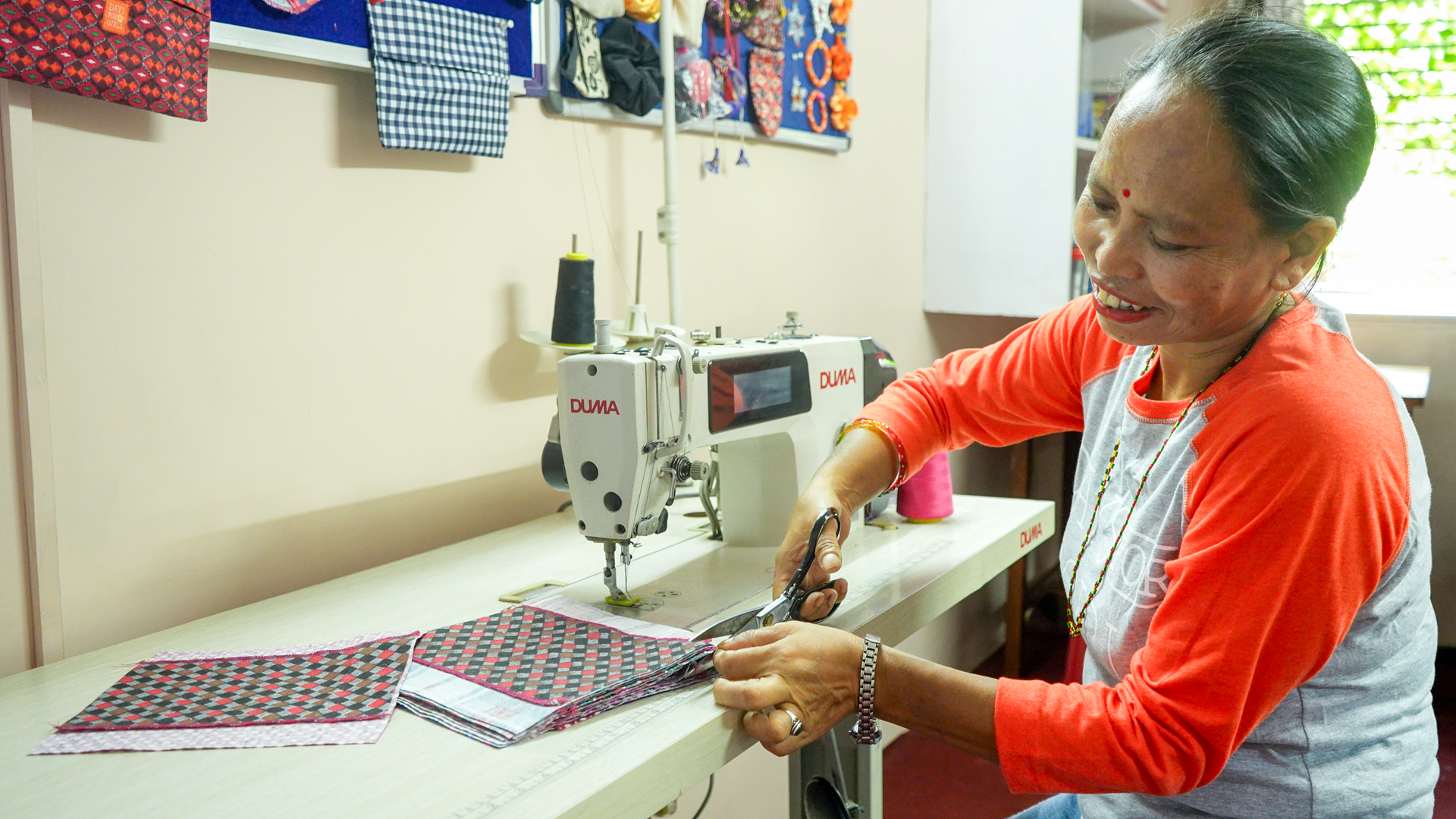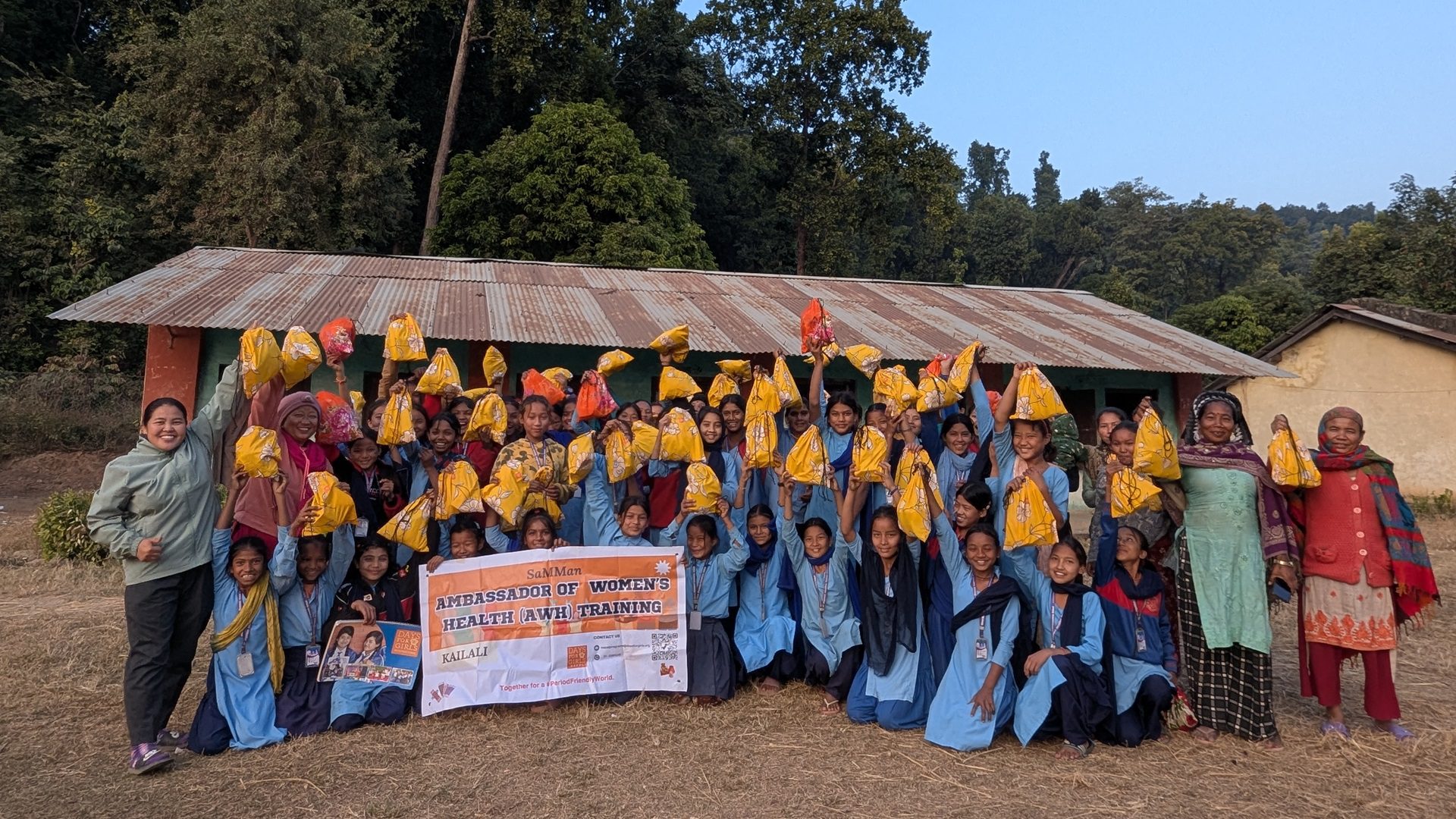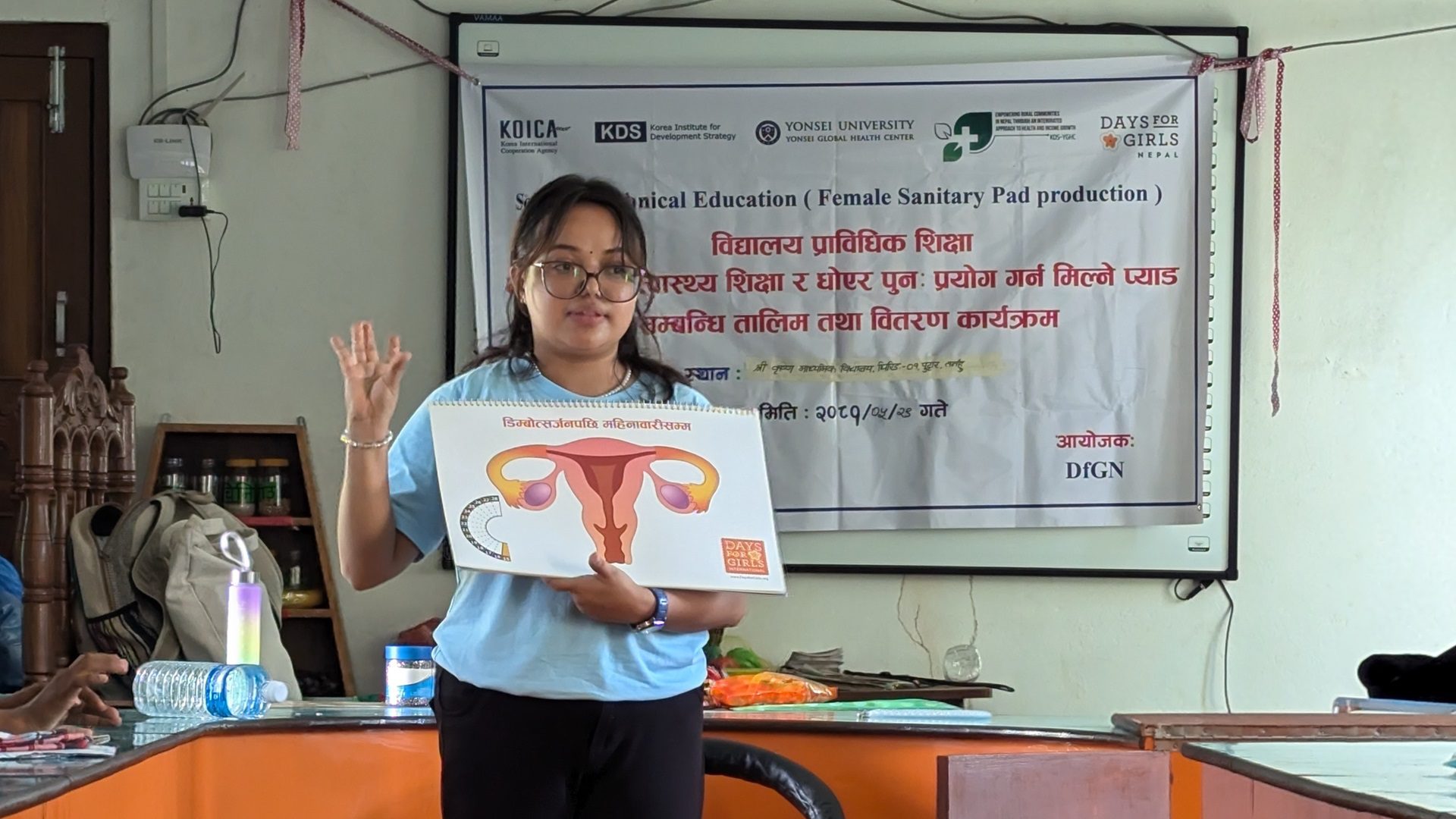On a Girls’s Expedition, Cliona learns concerning the realities of menstruation in some elements of Nepal – and meets the ladies working to vary the narrative.
I bury my face in a pile of still-warm T-shirts and leggings as I kind by means of my freshly washed laundry. Nothing beats the candy, soapy scent of fresh garments after every week of trekking.
As I shake out the final of the bag, a pair of interval lingerie falls on the ground. I choose them up and maintain them out in entrance of me. They give the impression of being acquainted. My dimension. However they’re not mine. So I ship a fast message to the group chat:
‘Morning! Is anybody lacking a pair of black interval lingerie? I picked them up within the launderette in Pokhara.’
It’s no massive deal. Only a mix-up. However just a few days later, I’d see that stray pair of underwear in an entire new mild.
I’m on Intrepid’s Girls’s Expedition in Nepal – a visit designed to let travellers expertise the nation by means of the eyes of native ladies. To this point, we’ve listened to morning prayers at Kapan Ani Gompa – a Buddhist nunnery the place ladies have a uncommon alternative to obtain a standard monastic schooling; we’ve realized easy methods to make momos with a stunning girl named Dolma who was born and raised in a Tibetan refugee camp; and we’ve danced to Shakira’s Waka Waka with our all-female trekking crew below a full moon within the Annapurna foothills.
My interval simply so occurred to coincide with the trek. Typical, I do know. Given the selection (if solely), I might’ve picked one other week. However I had painkillers on the prepared, a hefty inventory of Snickers and a bunch of sensible ladies by my facet. It was a slight inconvenience, but it surely wasn’t going to cease me.
However after we return to Kathmandu and go to an NGO known as Days for Women, I study that getting your interval goes far past inconvenience for some Nepali ladies.
Banished for bleeding
We pull up exterior a constructing on the busy road of Bafal Marg. There’s an indication studying ‘turning durations into pathways’ above the door. Motorbikes zip previous in an infinite stream, and whereas I linger for a niche within the site visitors, our chief, Keshu, strides out with an open palm, bringing the bikes to a halt. I shuffle behind her like a duckling.
Ready to greet us is Maya Khaitu, the nation director of Days for Women Nepal. The organisation is part of a worldwide non-profit working to get rid of stigma and limitations round durations. By means of group schooling and sustainable interval merchandise, the NGO is bettering the well being and livelihoods of women and girls in Nepal, Kenya and Guatemala, amongst different international locations.
‘Watch your heads,’ Maya warns as we climb a slim metallic staircase to a small classroom the place we’ll study extra. Two group members hand out small bouquets of powder-pink amaryllis flowers to every lady in our group as we settle into our seats. Though the home windows are shut, there’s no escaping Kathmandu’s soundtrack of honking horns and yapping canines.
‘As you recognize,’ Maya says, ‘menstrual well being is stigmatised.’ I see a wave of nodding heads within the nook of my eye. ‘However in far western and midwestern Nepal, ladies and ladies are banished to cattle sheds or makeshift huts throughout their interval.’
‘And simply two months in the past,’ she continues, ‘a lady was attacked by a tiger whereas she was sleeping in one in all these sheds.’
The road noise dissolves like sugar in a cup of masala chiya, and a collective gasp sweeps by means of the room.
This observe of isolating ladies on their interval is a part of chhaupadi, a centuries-old custom the place menstruation is seen as impure.
The tiger fled after villagers raised the alarm, Maya informed us. The girl survived with minor facial accidents, however some aren’t so fortunate. Extra lately, a lady tragically died from a snake chew in a menstrual shed in Kanchanpur.
This observe of isolating ladies on their interval is a part of chhaupadi, a centuries-old custom the place menstruation is seen as impure. Throughout their bleed, ladies aren’t allowed to remain within the residence or do on a regular basis duties like cooking and cleansing – and even contact others – out of concern they’ll deliver loss of life, sickness, crop failure or another dangerous luck to the household.
The huts, referred to as chhau goths, have poor sanitation and air flow, and ladies face many risks together with wild animal assaults, freezing temperatures, smoke inhalation and sexual assault. Sadly, many sexual assault instances go unreported resulting from social stigma and lack of satisfactory assist methods.
Maya tells us that previously, ladies would sleep in a cave or an open subject – even within the rain or snow. ‘Some older ladies have mentioned, “Oh, these ladies are so fortunate staying in a cow shed!” – as a result of typically all that they had was a basket full of hay to scatter and sleep on.’
Once we ask Maya how the ladies really feel about chhaupadi, she says it’s sophisticated.
‘As a result of ladies are indoctrinated concerning the beliefs surrounding menstrual impurity from a younger age, there’s typically a mix of social conditioning and prepared participation resulting from concern of religious repercussions in the event that they break the principles. It may be tough to differentiate real perception from reluctant compliance.’

Life-changing interval kits
The Nepali authorities outlawed chhaupadi in 2005 and has tried to destroy the huts, but it surely typically continues resulting from deep-rooted taboo and superstition.
‘The federal government supplies free pads, however they typically run out quick and are poor high quality. They usually don’t all the time present schooling and different options to chhaupadi, in order that’s the place we step in,’ Maya says.
Working with native authorities, Maya and her group ship workshops and interval kits across the nation.
The package features a workbook on the whole lot from copy, consent and sexually transmitted infections to human trafficking and youngster marriage. (Like chhaupadi, youngster marriage nonetheless continues regardless of the federal government growing the authorized age to marry from 18 to twenty in 2017.) By means of menstrual well being schooling, they discover it simple to spark wider conversations about ladies’s security.
‘We discuss concerning the adjustments that occur throughout puberty, as we need to put together preteens to speak confidently about their issues, considerations and the way they really feel. And after we maintain ladies’s circles, we speak about menopause too,’ Maya says.
The package additionally comprises a cycle-tracking calendar and specifically designed reusable sanitary napkins – patented by Days for Women and made in-house. I can hear the faint click-clack of stitching machines downstairs.
‘In the course of the coaching, we present them easy methods to put on the napkins – and it’s not like this!’ she says, smiling as she pulls it over her denims to show how some ladies assume they go over their saris.
The napkins are fantastically designed with shiny colors and daring patterns – at first look, they may cross for a small coin purse. However what strikes me is how nifty they’re. Every set comes with a protecting waterproof defend (secured with snap-buttoned wings) and some absorbent liners that slot inside and may be tri-folded to fit your move. They wash simply, dry shortly and final for as much as three years.
‘Once I was youthful,’ Maya displays, ‘we didn’t have pads, so we needed to scrunch up outdated material. I used to be scared to run or stroll, however with these, you possibly can soar, dance, do something you need! It provides you freedom.’
She tells us that even ladies in Kathmandu, who can afford and entry disposables, are shopping for these kits as they’re higher for the surroundings.
Learn extra: What it’s like on a Girls’s Expedition in India


Training is the whole lot
Since 2016, Days for Women Nepal has reached over 65,500 ladies and ladies with their pad kits and schooling periods. College absenteeism has lowered in consequence, they usually have helped create revenue alternatives by coaching ladies to make and promote pads of their communities.
As a result of ending interval stigma includes everybody, they’ve additionally had over 2000 males and boys be a part of their Males Who Know program.
‘Many boys and males are genuinely fascinated by understanding menstrual well being and need to assist the ladies of their lives. After the periods, their notion of durations typically shifts from one in all taboo or misunderstanding to one in all empathy and consciousness.’
On just a few events, Maya mentions that their method is to not inform communities what to do. As an alternative, they hope their workshops assist individuals make knowledgeable selections about whether or not to proceed chhaupadi, primarily based on a deeper understanding of well being, security and human rights.
Amassing knowledge on entrenched cultural practices is difficult, however round 90 per cent of households in Kalikot, Manma, Sipkhana, Mumra and Siuna now permit ladies and ladies to sleep in separate rooms at residence as a substitute of sending them to chhau goths.
‘It should take some time, step-by-step, however issues are slowly altering by means of schooling.’
Learn extra: An Intrepid journey impressed me to uproot my life and transfer to Morocco


From stigma to energy
As we climb into the minivan and fasten our seatbelts, Maya and her group – the ladies turning durations into pathways – lean over the balcony railings, waving us goodbye.
I take into consideration the occasions I’ve been doubled over with cramps, however within the consolation of my own residence, with a scorching water bottle and a cup of tea. I take into consideration the merchandise accessible to me – the truth that I should purchase them with my very own cash and with out disgrace. And I take into consideration the stigma that also lingers, all around the world, round one thing as regular and common as durations. Exhausting to imagine, actually, provided that half the worldwide inhabitants experiences it as some level of their lives.
These forgotten lingerie from the laundry mix-up won’t have been mine, however they represented freedom for a lady to reside, transfer and do what she needs, even when she’s bleeding. A freedom not all ladies have. And one I’ll by no means take as a right.
‘Our message is to let ladies know that menstruation is highly effective and delightful,’ Maya informed us. ‘The uterus is your first residence, and if menstruation is impure, then everyone seems to be impure. That’s the place we begin. It’s easy!’
It’s a easy fact in a posh world, and one this NGO is on a mission to share – one dialog and interval package at a time.
Cliona travelled on Intrepid’s Nepal: Girls’s Expedition. The price of the journey features a donation to Days for Women, so by travelling with Intrepid, you’ll be supporting the organisation’s essential work.

